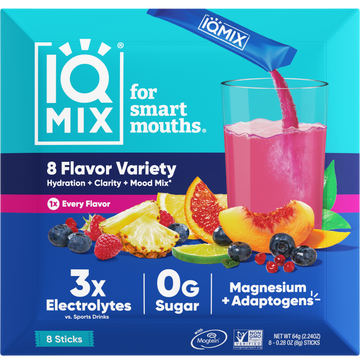Electrolytes play a crucial role in our body’s daily functioning. They’re responsible for maintaining fluid balance, supporting muscle and nerve function, and so much more.
Unfortunately, it’s not uncommon to neglect your electrolyte intake, leading to dehydration, poor cognitive function, and a host of related health problems. This is where electrolyte replacement comes in.
In this article, we’ll explain what electrolytes are, signs of electrolyte deficiency, who might need electrolyte replacement, and how to achieve it.
What Are Electrolytes?
Electrolytes are vital minerals that carry an electric charge when dissolved in water. You need them to move, think, and live (aka they’re very important!). They’re obtained through the foods and drinks you consume, and are lost through sweat, urine, and other bodily functions.
These minerals play an essential role in many bodily processes, including nerve and muscle function, hydration, blood acidity, blood pressure balance, and tissue repair.[*]
Electrolytes found in the body include:
- Sodium
- Potassium
- Chloride
- Calcium
- Magnesium
- Phosphate
- Bicarbonate
Who May Benefit from Electrolyte Replacement?
While electrolyte drinks aren’t typically necessary for everyday use, there are several situations in which they can be extremely helpful for preventing dehydration and supporting overall health.
#1: Those Who Exercise
After a particularly sweaty workout or day in the sun, you may have noticed that your skin can feel a bit gritty. That grit is salt that leaves your body, along with water, when you sweat.
If athletes have lost too many electrolytes through sweat and attempt to rehydrate with plain water, they’ll likely remain dehydrated. Why? Because electrolytes, particularly sodium and potassium, are needed to deliver water to your body’s cells.
Supporting your body with electrolytes before or after working out can make a big difference in your performance and how you feel.
#2: Those Who Exert Themselves in Warm Weather
Similarly, someone who is exercising or exerting themselves on a hot day will sweat more and, consequently, lose more electrolytes. In these instances, drinking water with electrolytes is key.
#3: Those on a Low-Carb Diet Like Keto
Those following very low-carb diets, such as keto, are more prone to electrolyte deficiency for various reasons. The shift into ketosis—where the body starts burning fat for fuel instead of carbs—results in the production of ketones.
Ketones serve as an energy source when carbohydrates are scarce, however, the production and release of ketones into the bloodstream can have a diuretic effect, causing increased electrolyte loss through urination.[*]
Additionally, the low-carb nature of the ketogenic diet leads to lower insulin levels in the bloodstream, which signals the kidneys to excrete sodium at a higher rate, further contributing to electrolyte loss.
This, combined with a typically lower salt intake on the keto diet and the elimination of high-carb, electrolyte-rich foods such as legumes and most fruits, can make it difficult to maintain proper electrolyte balance.[*]
As such, many people following a low-carb diet could benefit from an electrolyte replacement supplement.
#4: Those Eating a Whole-Foods Diet
Eating a diet composed of healthy, whole foods is undeniably the best choice for your health, but doing so can put you at a greater risk of electrolyte deficiency. This is because processed foods are one of the top sources of sodium.
While whole foods have some natural sodium, they don’t have nearly as much as processed foods. Consequently, when you eliminate processed foods, you may find yourself sodium deficient.
Generously salting your food and/or taking an electrolyte replacement supplement can help combat this.
#5: Those with Increased Fluid Loss Due to Illness
In addition to urination, we also lose fluids and electrolytes through feces and vomiting. If you’re facing excessive fluid loss due to an illness, incorporating an electrolyte supplement along with adequate water and food intake may be beneficial.
However, it’s advisable to consult with a healthcare professional to determine if an electrolyte replacement is necessary for your specific situation.
What Are the Risks of Electrolyte Deficiency?
Electrolyte deficiencies can lead to a range of symptoms and health problems, including:[*]
- Dehydration: Electrolytes play a crucial role in maintaining fluid balance in the body, and a deficiency can lead to dehydration.
- Muscle weakness and cramping: Electrolyte imbalances, particularly involving sodium, potassium, and magnesium, can cause muscle weakness and cramping.
- Heart problems: Electrolytes, particularly sodium and potassium, are essential for regulating heart function, and a deficiency can lead to heart problems such as arrhythmias.
- Nerve problems: Electrolytes play a crucial role in proper nerve function, and a deficiency can lead to nerve problems such as tingling, numbness, and muscle weakness.
- Fatigue: Electrolyte deficiencies can lead to fatigue, as the body’s cells cannot function properly without adequate electrolyte levels.
- Mental problems: Electrolyte imbalances can affect brain function, leading to confusion, mood changes, and other cognitive issues.
In severe cases, an electrolyte imbalance can cause serious, life-threatening problems, such as coma, seizures, and sudden cardiac arrest. These cases are rare and typically require intravenous electrolyte treatment in a hospital.[*]
Which Electrolytes Are the Most Important?
While all electrolytes are essential, there are certain ones that people are most commonly deficient in. These are also arguably the most important electrolytes:
- Sodium: Helps regulate fluid balance, maintains blood pressure, and supports nerve and muscle function.
- Potassium: Important for maintaining fluid balance, regulating blood pressure, and supporting muscle and nerve function.
- Calcium: Essential for strong bones and teeth, muscle contraction, and proper nerve function.
- Magnesium: Vital for muscle and nerve function, blood pressure regulation, and energy production.
How to Replenish Electrolytes
There are only two ways to get electrolytes:
- Foods (including salt)
- An electrolyte supplement
Some foods that are high in electrolytes include bananas, oranges, leafy greens, dairy products, nuts, seeds, avocados, sweet potatoes, tomatoes, and coconut water. Many of these foods, however, are not permitted on low-carb diets.
To replace electrolytes, many people will turn to brightly-colored sports drinks (you know the ones). These drinks are essentially adult Kool-Aid with some sodium and, sometimes, potassium added. They’re loaded with sugar and flavored (and colored) with chemicals. No, thank you.
If quick and healthy electrolyte replacement is your goal, a high-quality electrolyte supplement, such as IQMIX, is the way to go. IQMIX is sugar-free, vegan, and keto-friendly and contains only 3 grams of carbohydrates and 10 calories per packet.
It provides the key electrolytes needed for proper hydration, including:
- 500 mg sodium
- 450 mg potassium
- 750 mg Magtein®, a clinically studied form of magnesium (magnesium L-threonate) that supports cognition and mood
As a bonus, each packet contains 250 mg of super-concentrated lion’s mane mushroom—an adaptogen that supports brain health and function[*]
It’s also non-GMO and free of dairy, gluten, and soy. Choose from delicious flavors, including Peach Mango, Lemon Lime, Blueberry Pomegranate, and Blood Orange. If you’re unsure what flavors to pick, try our 8-Stick Sampler.
Simply mix a packet of IQMIX into water to make an instant electrolyte drink for pre- and post-exercise, travel, fun in the sun, or anytime wellness!




